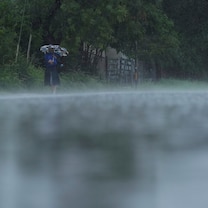Excerpt: 'Miracles on the Water'
May 1, 2006 — -- In 1940, the British liner SS City of Benares was targeted by a German submarine in the North Atlantic while heading to Canada to escape the German blitz over England.
More than 400 people were onboard, including 90 children, who believed they were fortunate to be heading to Canada and out of the war zone.
The ship sank in a half hour, and although there was little chance of survival, some made it out alive.
"World News Tonight" senior broadcast producer Tom Nagorski tells their story, using firsthand accounts from child survivors and other passengers of the Benares. Below is an excerpt from his book, "Miracles on the Water: The Heroic Survivors of a World War II U-Boat Attack." The book is published by Hyperion Books, which is owned by the Walt Disney Corp., ABC's parent company.
Chapter One: "We've Been Hit!"
Beth Cummings sat upright, lifted suddenly from sleep, and not sure why. It was dark, black-night dark, nothing stirring in her small cabin, and she was wide awake.
A bad dream, perhaps. But then she felt the ship shudder. Rough seas, Beth thought. Very rough seas.
She felt for the light switch. The light wouldn't come on.
An alarm sounded nearby. She heard groans and rustling, someone in the adjoining cabin. That might be her friend Bess, up and about. Maybe she knew what was happening.
Beth Cummings stepped gingerly from her bed into a gathering pool of water.
Bess Walder had never been a sound sleeper. She was in the top bunk next door. The jolt woke her instantly.
That's a torpedo! she thought.
She heard another bang, felt the floor shake, then a sound like a closet full of glass, things rattling and breaking inside. Bess came down the ladder and called to the girl in the lower bunk.
"C'mon! Get out!"
The girl shivered under her blanket. She didn't want to go.Bess Walder was fifteen years old. Beth Cummings was fourteen.
Fred Steels was eleven, and in his cabin there was chaos. The room shook, glass shattered, an armoire crashed, and when Steels tried to leave his bed he found himself trapped. Heavy planks of wood had fallen, making a misshapen "X" just inches above his body.
Parts of the bunk had collapsed, right on top of him.
Steels, a strong and stocky child, pushed up at the wood. Good thing there's nobody in my top bunk, he thought. One of Steels' cabin mates was crying for his glasses. Alarm bells rang. He heard nothing from the third boy in the cabin, an eleven-year-old named Paul Shearing. He sleeps through anything.
Steels worked at the wood, nudged a fat piece up, away from his face. I can do it, he thought. I can get out. He shoved another plank aside.
Then Fred Steels realized he was soaking wet. It's blood, he thought, but then he felt a soft spray coming from the washbasin. Water, not blood. The pipes had burst.
Suddenly Steels understood what had happened. "We've been hit!" he cried, trying to rouse his cabin mates. The two other boys shifted in their bunks, still fuzzy-headed."Come on, then!"
Finally Steels was free, squirming through a narrow space he had made between the wood planks and the side of his bed. He pulled on his bulky life jacket and felt for his shoes in the dark. There they are.
He tried to find his suitcase, then realized there was no point in carrying anything to the ship's deck. Water shot from the basin. Steels' life jacket was getting wet.
Paul Shearing was up now. He had found his life jacket, and a coat his mother had bought for her son's journey. Then, searching for his shoes, Shearing felt a jab in his foot.
"Oww!"
Steels spun around. "What's happened?"
Shearing winced. He had cut his heel on a piece of glass. "It's all right."He stepped gingerly in the water, feeling a sharp sting in his foot. After a while he found a pair of sandals. The third boy in the cabin had found his glasses.
They fumbled about in this way, and then, perhaps two minutes after the initial jolt, the three boys shuffled out the cabin door and along an already-crowded hallway.Bess Walder and Beth Cummings were making their way somewhere behind them. Together they were among the youngest, and arguably the most important, passengers on board the British liner SS City of Benares.
The Benares carried 215 crew and 191 passengers, including 90 boys and girls who were pioneers in a program designed to spirit British children to safer shores. These young evacuees had been chosen from the country's most vulnerable communities, from households particularly battered by the German bombardment. It was a bold and controversial experiment, involving thousands of children. They were sailing for Canada, away from war, and they had no idea how long they would be gone.It was mid-September, 1940. World War II was one year old.
For several days the mood on board the Benares had been cheerful, almost festive. They had left home and family, to be sure, but they had also bid farewell to air raids and rations, put behind them what one of the boys called the "everyday horror" of the German Blitzkrieg. Adolf Hitler's air force had pummeled Liverpool in the days before the Benares set sail from that same port; the children and their escorts had watched the bombs as they fell.





